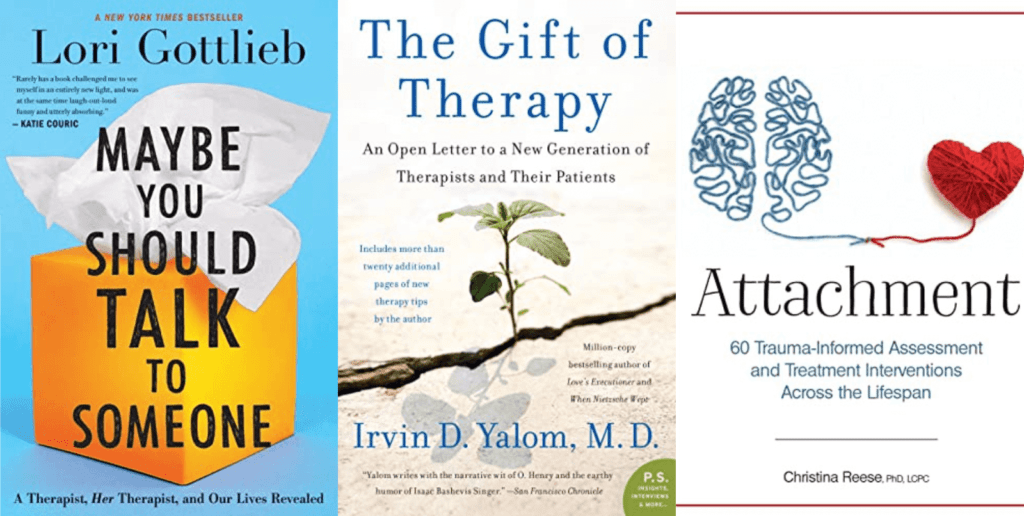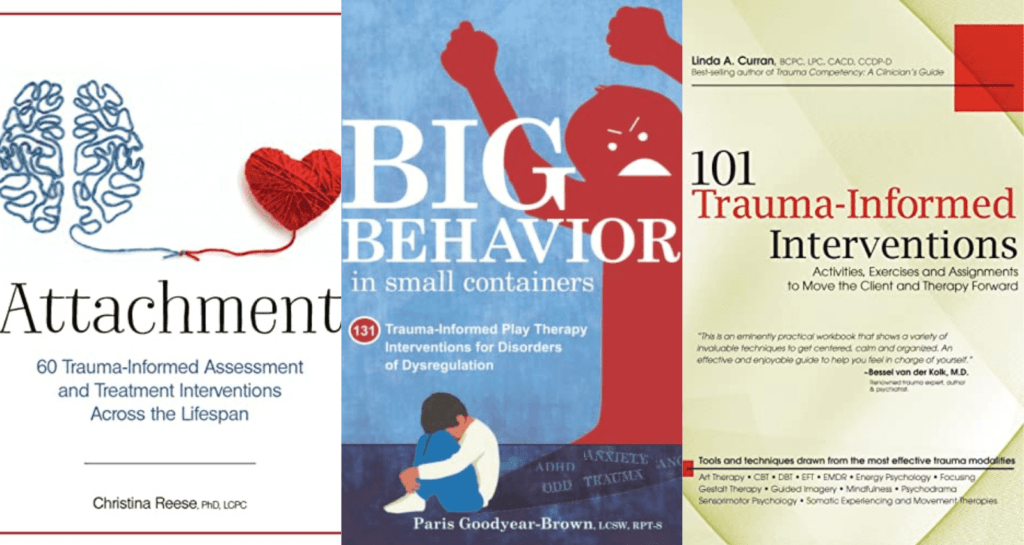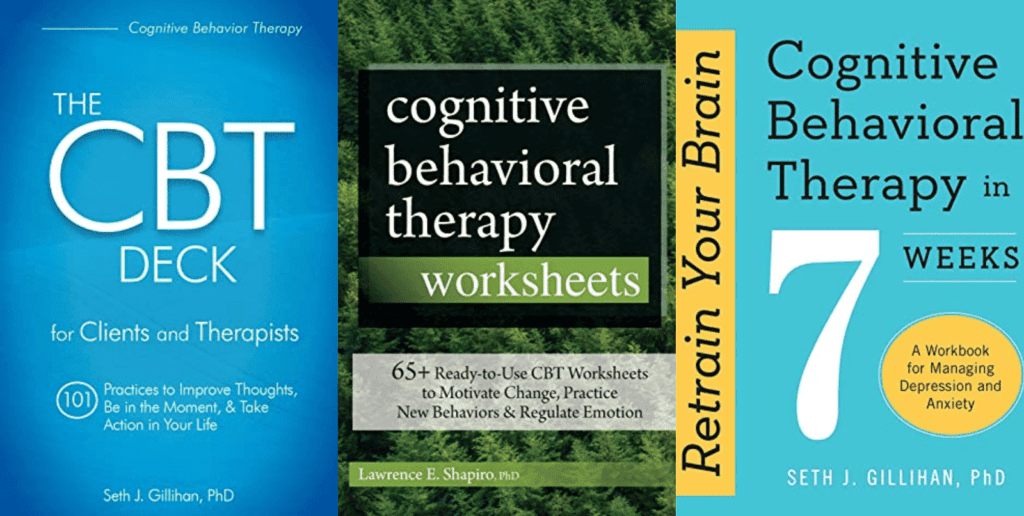The following are some of the best books for therapists.
- Books For Therapists
- 1. The Gift of Therapy
- 2. The Comprehensive Clinician’s Guide to Cognitive Behavioral Therapy
- 3. The DBT Deck for Clients and Therapists
- 4. Practicing Mindfulness
- 5. 101 Trauma-Informed Interventions
- 6. No Bad Parts
- 7. Attachment
- 8. The Mindfulness Toolbox
- 9. Maybe You Should Talk To Someone
- 10. Thriving As A Therapist
- 11. The Resilient Practitioner
- 12. A Therapist Journal
- How Books for Therapists Can Help?
- Conclusion
Disclosure: Some of the links below are affiliate links. This means that, at zero cost to you, I will earn an affiliate commission if you click through the link and finalize a purchase.
Books For Therapists
1. The Gift of Therapy
By Irvin Yalom

In this insightful and thought-provoking work, Yalom shares his wisdom, experience, and guidance with both therapists and their clients.
Yalom offers a unique perspective on the therapeutic process, emphasizing the importance of building authentic relationships and connections between therapists and their patients. He encourages therapists to be actively engaged, present, and genuine in their interactions, fostering an atmosphere of trust and collaboration.
The book delves into various therapeutic techniques, sharing practical advice and illustrating the power of empathy, curiosity, and self-disclosure in facilitating meaningful change. Yalom promotes the idea that therapy is an ongoing journey of personal growth for both therapists and patients, highlighting the transformative potential inherent in the therapeutic relationship.
Through personal anecdotes and case studies, Yalom provides a candid and compassionate portrayal of the challenges and rewards of therapy. He explores topics such as existential concerns, the fear of death, the quest for meaning, and the complexities of human relationships. Drawing from his extensive clinical experience, Yalom offers valuable insights into navigating these universal human struggles.
Related: Top 100 Therapy Questions
2. The Comprehensive Clinician’s Guide to Cognitive Behavioral Therapy
By Leslie Sokol, Marci Fox

This book provides a comprehensive overview of CBT principles and techniques, equipping clinicians with the knowledge and skills necessary to effectively implement this evidence-based treatment approach.
Sokol and Fox present CBT in a clear and accessible manner, making it suitable for both novice and experienced clinicians. The book offers a step-by-step guide to conducting CBT sessions, providing practical strategies for assessment, case formulation, and treatment planning. The authors also cover various CBT techniques, including cognitive restructuring, behavioral activation, exposure therapy, and skills training.
One of the notable strengths of this book is its emphasis on tailoring CBT to meet the specific needs of individual patients. Sokol and Fox delve into the process of individualized case conceptualization, highlighting the importance of understanding a client’s unique experiences, beliefs, and goals. They demonstrate how to adapt CBT interventions to address a wide range of psychological conditions, such as anxiety disorders, depression, and trauma-related disorders.
Throughout the book, the authors integrate clinical examples and case studies to illustrate the application of CBT techniques in real-world settings. This not only enhances comprehension but also provides readers with practical guidance and inspiration for their own therapy practice.
“The Comprehensive Clinician’s Guide to Cognitive Behavioral Therapy” also acknowledges the ever-evolving nature of CBT and introduces contemporary advancements, such as third-wave CBT approaches like mindfulness-based cognitive therapy and acceptance and commitment therapy.
Related: Best 10 CBT Therapy Books
3. The DBT Deck for Clients and Therapists
By Lane Pederson

This deck of cards provides 101 practical and evidence-based activities and exercises that can assist individuals in managing distress, regulating emotions, and improving their relationships.
DBT is a therapeutic approach that combines elements of cognitive-behavioral therapy with mindfulness practices, emphasizing the development of skills for emotional regulation, interpersonal effectiveness, distress tolerance, and mindfulness. Pederson’s deck of cards brings these skills to life, offering a variety of interactive exercises that can be easily incorporated into therapy sessions or used as self-help tools.
Each card in the deck outlines a specific practice, providing clear instructions and guidelines for implementation. The activities cover a wide range of topics, including emotion regulation, distress tolerance, interpersonal effectiveness, and self-care. The deck is designed to be versatile, allowing clients and therapists to select practices that are most relevant to their goals and needs.
One of the notable strengths of this deck is its emphasis on mindfulness. Mindfulness is an essential component of DBT and has been shown to be effective in reducing stress, increasing self-awareness, and facilitating emotional regulation. The activities in this deck incorporate mindfulness exercises, such as breathing techniques, meditation practices, and body scans, which can help individuals cultivate present-moment awareness and nonjudgmental acceptance.
Related: Best 23 Therapist Gifts Ideas
4. Practicing Mindfulness
By Matthew Sockolov

Mindfulness meditation is a technique derived from ancient Buddhist practices and has gained significant attention in modern psychology. It involves deliberately focusing one’s attention on the present moment, without judgment or attachment to thoughts or feelings that may arise. This practice has been scientifically proven to have numerous benefits for mental health, including reducing stress, improving concentration, boosting resilience, and promoting emotional regulation.
Sockolov’s book presents a diverse selection of 75 guided meditations, each with detailed instructions and explanations. These meditations cover a variety of themes and aspects of mindfulness, such as breath awareness, body scan, loving-kindness, gratitude, and self-compassion. By incorporating these practices into their daily routine, readers can gradually cultivate a greater sense of presence, awareness, and calm in their lives.
The author not only provides step-by-step guidance for each meditation but also offers insights into the underlying principles and concepts of mindfulness. This understanding helps individuals deepen their practice and establish a strong foundation for incorporating mindfulness into their everyday lives.
Related: FREE Therapy Journal Template
5. 101 Trauma-Informed Interventions
By Linda Curran

This book provides therapists with practical tools and techniques to help clients heal from traumatic experiences and progress in their therapeutic journey.
Trauma-informed care is an approach that recognizes the impact of trauma on individuals’ lives and aims to create safe and empowering environments for healing. The interventions presented in this book are based on the principles of trauma-informed therapy, incorporating evidence-based practices drawn from various therapeutic modalities.
Curran’s book offers 101 different interventions, including activities, exercises, and assignments, which can be tailored to fit the unique needs and preferences of each client. These interventions cover a wide range of therapeutic approaches, such as cognitive-behavioral therapy (CBT), narrative therapy, art therapy, mindfulness, and relaxation techniques.
The interventions provided in this book help clients develop essential coping skills, process traumatic memories, regulate their emotions, and build resilience. Additionally, they promote self-reflection, self-compassion, and self-empowerment. Each intervention is accompanied by clear instructions, rationales, and suggestions for implementing them in therapy sessions.
Related: Best 10 Narrative Therapy Books
6. No Bad Parts
By Richard Schwartz Ph.D., Alanis Morissette

Dr. Schwartz, the creator of IFS, provides valuable insights and practical guidance to help individuals navigate their inner world and develop a harmonious relationship with their internal system.
The Internal Family Systems model proposes that each individual possesses multiple “parts” or subpersonalities, each with its own unique emotions, beliefs, and desires. This book introduces readers to the concept of “Self,” the compassionate and wise core of our being that can lead the healing process within the internal system.
Dr. Schwartz explains how trauma can disrupt the natural harmony of the internal system, causing certain parts to become burdened with extreme emotions, vulnerability, or protective behaviors. By utilizing the principles and techniques of IFS, individuals can learn to identify, understand, and communicate with their various parts, facilitating healing and restoring wholeness.
Through compelling case examples and practical exercises, Dr. Schwartz guides readers in accessing their Self and developing a trusting relationship with their internal parts. He offers strategies for cultivating self-compassion, managing triggers, and transforming challenging emotions.
Related: Best 7 Ideas On How To Celebrate Mental Health Awareness Month
7. Attachment
By Christina Reese

This book provides clinicians with a comprehensive collection of evidence-based interventions to support individuals who have experienced trauma and struggle with attachment difficulties.
Drawing on the latest research in the field of attachment theory and trauma, Christina Reese offers practical techniques and interventions that can be implemented across various therapeutic settings. The book covers a wide range of developmental stages, from infancy to adulthood, and addresses the impact of trauma on attachment styles and relationships.
Reese emphasizes the significance of establishing a safe and trusting therapeutic relationship, as well as utilizing a trauma-informed lens to understand clients’ attachment patterns. By incorporating these principles, therapists can effectively assess individuals’ attachment styles and tailor targeted interventions to meet their specific needs.
Through a combination of case examples, worksheets, and step-by-step guidance, Reese equips mental health professionals with a diverse toolkit of trauma-informed interventions. These interventions focus on enhancing self-regulation skills, promoting healthy attachment relationships, and facilitating healing from past traumatic experiences.
Related: Best 9 Nonfiction Books About Mental Health
8. The Mindfulness Toolbox
By Donald Altman

Altman presents a collection of 50 mindfulness-based tools and exercises that are easily accessible and can be incorporated into one’s routine. These tools help individuals become more aware of their thoughts, emotions, and bodily sensations, promoting a sense of present-moment awareness and acceptance.
By engaging in the practices outlined in this book, individuals can develop skills to navigate challenging emotions, increase resilience, and alleviate the symptoms associated with anxiety, depression, stress, and pain. Altman also provides handouts and worksheets that readers can use to enhance their understanding and implementation of mindfulness techniques.
Throughout the book, Altman emphasizes the importance of regular mindfulness practice and highlights how it can positively impact one’s overall well-being. He walks readers through different mindfulness exercises, such as breath awareness, body scan, mindful movement, and loving-kindness meditation, offering clear instructions and valuable insights along the way.
Related: CBT Worksheets Bundle (FREE PFD Download)
9. Maybe You Should Talk To Someone
By Lori Gottlieb

Drawing from her own experiences as a therapist and a patient, Gottlieb takes us on a captivating journey that explores the complexities of human emotions, relationships, and personal growth.
In this book, Gottlieb expertly weaves together personal anecdotes and professional insights to reveal the transformative power of therapy. Through her stories, readers gain a deeper understanding of the therapeutic process and the struggles faced by both therapists and clients.
Gottlieb brings to light the universal nature of human experiences and emotions, demonstrating that seeking therapy is a courageous and valuable step toward self-discovery and healing. By sharing her vulnerability and the challenges she faced in therapy, she breaks down the stigma surrounding mental health and encourages readers to consider therapy as a helpful resource.
Through the stories of her patients, Gottlieb illustrates the ways therapy can illuminate our blind spots, challenge our assumptions, and guide us towards personal growth and self-acceptance. She also offers valuable insights into the different therapeutic approaches, allowing readers to gain a better understanding of what to expect when engaging in therapy themselves.
Related: Best 8 Mindfulness Exercises For Adults That Will Help You Regulate Your Emotions
10. Thriving As A Therapist
By Megan Gunnell LMSW

With practical advice and expert insights, Gunnell provides valuable strategies to help therapists build a successful and fulfilling business.
In this book, Gunnell shares her wealth of knowledge and experience in the field of therapy, offering step-by-step guidance on various aspects of running a private practice. From establishing a solid business foundation to effectively attracting and retaining clients, she covers essential topics for therapists seeking to thrive in their careers.
Gunnell emphasizes the importance of developing a clear vision and setting achievable goals for your practice. She provides practical tools and resources to help therapists create and implement effective marketing and branding strategies, allowing them to connect with their target audience and stand out in a competitive market.
The book also delves into the importance of self-care and maintaining personal well-being while navigating the demands of a therapeutic practice. Gunnell offers practical tips for avoiding burnout, managing stress, and maintaining work-life balance, recognizing that therapists’ well-being directly impacts their ability to be effective clinicians.
11. The Resilient Practitioner
By Thomas M. Skovholt, Michelle Trotter-Mathison

This revised third edition offers valuable insights and practical strategies to prevent burnout, combat compassion fatigue, and promote self-care.
Skovholt and Trotter-Mathison recognize the unique demands and stressors that come with working in these professions. They provide a deep understanding of the factors that contribute to burnout and compassion fatigue, including heavy workloads, exposure to trauma, and the emotional toll of helping others.
Through this book, professionals in the helping professions learn evidence-based strategies to foster resilience and maintain their well-being. Skovholt and Trotter-Mathison emphasize the importance of self-awareness and self-reflection as a means to identify and address the signs of burnout and compassion fatigue.
“The Resilient Practitioner” offers concrete self-care strategies that professionals can integrate into their daily lives. These strategies include setting boundaries, practicing mindfulness, engaging in regular exercise and relaxation techniques, seeking support and supervision, and nurturing personal relationships outside of work.
The authors also explore the concept of professional identity and its role in maintaining resilience. They provide guidance on cultivating a sense of purpose, finding meaning in one’s work, and developing a supportive professional network.
12. A Therapist Journal
By A Day to Remember Journals

This workbook serves as a comprehensive guide to help therapists effectively plan, document, and reflect on their therapy sessions.
The author, A Day to Remember Journals, understands the importance of organization and accountability in the therapeutic process. With this workbook, therapists are provided with a structured framework to plan their sessions in advance, ensuring that they are well-prepared and focused on their clients’ specific needs.
The journal also offers prompts and exercises to encourage therapists to reflect on their sessions after they have taken place. By engaging in this self-reflection process, therapists can gain valuable insights into their own therapeutic style, identify areas for growth, and make adjustments to optimize their practice.
Additionally, “A Therapist Journal” allows therapists to track important session details such as goals, interventions used, progress made, and any notable observations or breakthroughs. This thorough documentation not only helps therapists stay organized but also enhances communication and collaboration with their clients.
Related: Best 10 Acceptance And Commitment Therapy Books
How Books for Therapists Can Help?
Books for therapists can be incredibly beneficial in several ways:
1. Expanding knowledge: Therapists can gain a deeper understanding of various therapeutic approaches, theories, and techniques through books. This can enhance their ability to provide effective treatment and support to their clients.
2. Skill development: Books often offer practical strategies, exercises, and case examples that therapists can apply in their practice. They can learn new skills and interventions to address specific challenges or issues faced by their clients.
3. Continued learning and professional growth: Therapy is an ever-evolving field, and reading books allows therapists to stay up-to-date with the latest research and developments in the field. It helps them to refine their existing knowledge and incorporate new evidence-based practices into their work.
4. Self-reflection and personal growth: Reading books for therapists can also facilitate self-reflection and personal growth. They may explore their own biases, beliefs, and areas for personal improvement, which can ultimately enhance their therapeutic relationships and effectiveness.
5. Finding inspiration and support: Books for therapists often include stories, case studies, or narratives that can inspire and motivate therapists in their work. They may find reassurance, validation, or encouragement in the experiences shared by other clinicians.
6. Enhancing empathy and understanding: Books can provide insights into different client populations, cultural contexts, or specific mental health conditions. By expanding their understanding and empathy, therapists can better connect with diverse clients and provide more inclusive and culturally sensitive care.
7. Self-care and burnout prevention: Books can also address the importance of self-care, stress management, and burnout prevention for therapists. They offer guidance on maintaining a healthy work-life balance, setting boundaries, and recognizing signs of burnout.
Conclusion
Books for therapists serve as valuable resources that support professional development, skill-building, personal growth, and ultimately, the provision of compassionate and effective care to clients.



